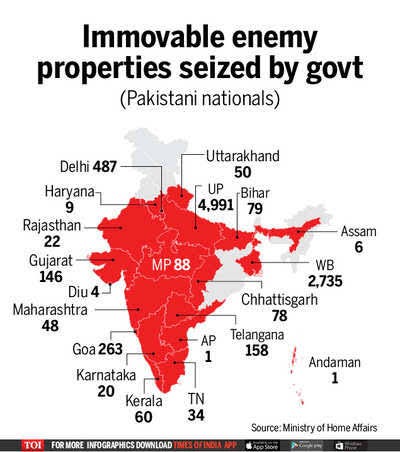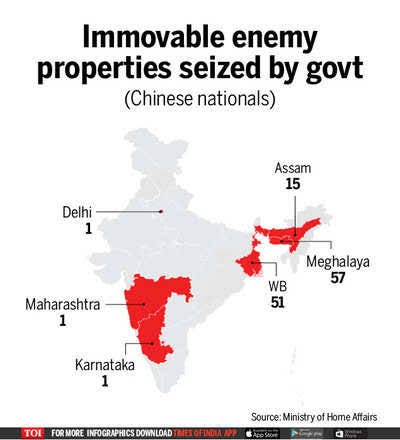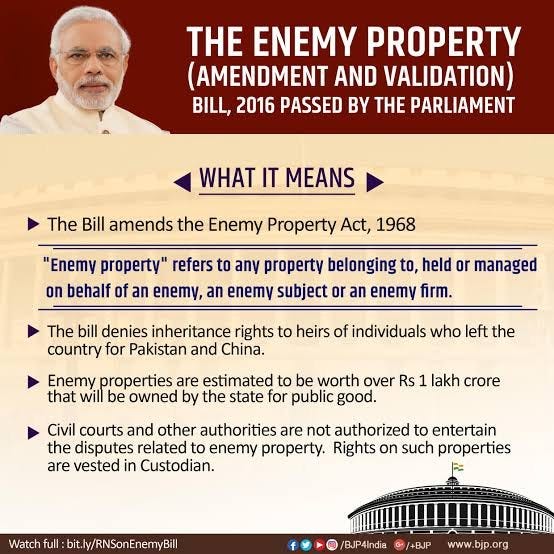🏘️Saif Ali Khan's Pataudi palace not safe: Govt might take over ₹15,000 cr property
Saif Ali Khan's Pataudi palace might be taken over by the govt but why? What is this enemy act? All questions answered!
Have you checked out our app yet? Download it now to get the same sharp analyses you love.
Market Watch
📈Sensex was up 115.39 points or 0.15 percent at 76,520.38, and the Nifty was up 50.00 points or 0.22 percent at 23,205.35
📈In the broader market, the Nifty Midcap 100 surged nearly 2 percent while the Nifty Smallcap 100 ended with 1.1 percent gains.
ICYMI
🏪GSRTC cancelled the licenses of 27 hotels that were using Hindu names for registration while being operated by Muslims
🎥Filmmaker Ram Gopal Varma has been sentenced to three months in jail over a cheque bounce case by a Mumbai court
✂️As the deadline for birthright citizenship looms, there's a notable surge in C-section requests in the US among expectant immigrant families, particularly from India
🚗The Indian Ministry of Consumer Affairs has issued notices to Uber and Ola over allegations of price discrepancies based on the smartphone used to book rides
🏏Rohit Sharma, playing his first Ranji Trophy match in ten years, was dismissed for just 3 runs against Jammu & Kashmir, marking a disappointing comeback.
🧪Adar Poonawalla, the CEO of Serum Institute of India, emphasizes the necessity of maintaining a proper work-life balance, warning against productivity beyond 8-9 hours daily
✈️India continues to maintain a consistent stance on the legitimate return of undocumented Indians amid US immigration policy changes
Saif’s palace is not safe
The Madhya Pradesh High Court has lifted the stay on the Pataudi family's property, potentially allowing government acquisition under the Enemy Property Act. The historical properties, worth Rs 15,000 crore, are linked to Bollywood actor Saif Ali Khan.
Inside Saif Ali Khan’s ₹800 crore Pataudi Palace in Gurgaon
Problematic properties: The properties in question, worth an estimated ₹15,000 crore, include several prominent historical sites such as the Flag Staff House, Saif’s childhood home; Noor-Us-Sabah Palace, now a luxury hotel; Dar-Us-Salam; Ahmedabad Palace; and Kohefiza Property.
These assets were designated enemy property because they belonged to the Pataudi family, whose ancestral ties trace back to Nawab Hamidullah Khan.
His eldest daughter, Abida Sultan, migrated to Pakistan after Partition, triggering the classification of these properties as enemy assets.
Legal battle: Saif Ali Khan, along with his mother Sharmila Tagore, has been fighting a long legal battle against a 2015 order from the Custodian of Enemy Property, which declared the family’s properties as enemy assets.
The Madhya Pradesh High Court recently directed Saif to approach an appellate authority to contest the classification.
The court has given him a limited timeframe to make his case, failing which the properties will be permanently vested with the Custodian.
Historically, the dispute stems from the inheritance of properties owned by Nawab Hamidullah Khan, the last king of Bhopal. The Nawab's eldest daughter, Abida Sultan, initially inherited the property as per custom but migrated to Pakistan in 1950.
Following her departure and the Nawab's death, her sister, Sajida Sultan, who remained in India, became the legal owner. Sajida Sultan, Saif Ali Khan's grandmother, inherited the property.
However, in 2014, the Custodian of Enemy Property for India designated the land as enemy property under the Enemy Property Act of 1968, igniting a legal battle over its ownership.
What is Enemy Property Act: The Enemy Property Act of 1968 has undergone significant evolution, particularly with amendments aimed at addressing loopholes and reinforcing government control over assets left by individuals who migrated to enemy nations like Pakistan and China. Enacted after the 1965 Indo-Pak war, the act sought to manage these properties to prevent their misuse against India's national interests.


The act initially allowed legal heirs to claim and manage enemy properties while vesting primary control in the Custodian of Enemy Property for India, a government-appointed body under the Ministry of Home Affairs.
It defined enemy property as assets owned by individuals who migrated to enemy nations, covering both movable and immovable assets.
Amendments in act: Amendments introduced through the Enemy Property (Amendment and Validation) Act, of 2017, brought sweeping changes to close loopholes exploited by legal heirs and ensure perpetual state control of these properties.
Expanded Definition: Legal heirs, even if Indian citizens, were included in the definition of "enemy," barring them from inheriting such properties.
Permanent Custodianship: Clarified that enemy property remains with the Custodian indefinitely, regardless of changes in the owner’s nationality or death.
Jurisdictional Restrictions: Limited disputes over enemy property to High Courts and the Supreme Court, excluding civil courts from such matters.
Prohibition on Transfer: Nullified any previous or future attempts to transfer or inherit these properties, securing them under state management.
Other notable cases: The Enemy Property Act has played a pivotal role in several high-profile legal disputes. Here are some notable examples:
A prominent case involves Raja Mahmudabad, whose vast properties in Uttar Pradesh were classified as enemy property after he migrated to Pakistan in 1957. Although his family remained in India, legal battles over these assets persist, highlighting the complexities of citizenship and property ownership under the act.
The Said Ali case reveals potential misuse of the act. His family discovered their land had been declared enemy property only when they attempted to sell it, raising concerns about the law being exploited by individuals with political influence.
Properties like Diana Talkies in Mumbai, originally a private trust, were claimed as enemy property due to historical ties with individuals who migrated to Pakistan.
Similarly, families in Kerala have faced disputes over ancestral lands linked to relatives who migrated for trade but did not settle permanently in Pakistan.
Jinnah’s property in Mumbai: The Jinnah House in Malabar Hill, Mumbai, associated with Muhammad Ali Jinnah, the founder of Pakistan, has been a focal point of legal and political debate. Legally, it is classified as "evacuee property" under the Evacuee Property Act, 1950, rather than "enemy property" under the Enemy Property Act, 1968.
This distinction stems from its designation in 1949 after Jinnah migrated to Pakistan post-Partition. As a result, the property remains under the ownership of the Indian government, and claims by Jinnah's descendants, including a 2010 petition by his daughter Dina Wadia, have not been recognized.
Politically, Pakistan has expressed interest in acquiring Jinnah House to use as a consulate or cultural center, but the Indian government has consistently stated that there are no plans to sell or lease the property.
Domestically, the house has sparked controversy, with some Indian politicians suggesting its demolition due to its association with Partition, while others emphasize its historical significance.
Evacuee vs Enemy act
Tweet du jour
Hi, I’m Aniket Mishra, the editor of this newsletter. I’d love to hear some feedback on the newsletter. WhatsApp me directly and tell me what you think.






